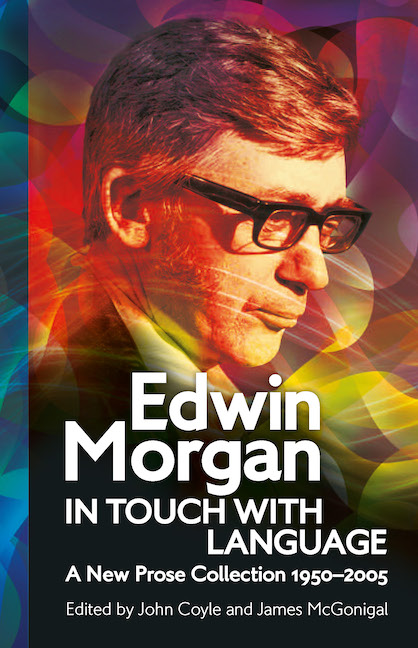
Edwin Morgan: In Touch With Language
A New Prose Collection 1950–2005
Edited by John Coyle and James McGonigal
Paperback, 424 pages
ASLS, April 2020
Price £24.95
ISBN 978-1-906841-40-9
“I try to write something every day even though I am not writing poetry, just to get myself in touch with language.”
—Edwin Morgan
Edwin Morgan (1920–2010) is one of the giants of modern literature. Scotland’s national poet from 2004 to his death, throughout his long life he produced an astonishing variety of work, from the playful to the profound.
Edwin Morgan: In Touch With Language presents previously uncollected prose – journalism, book and theatre reviews, scholarly essays and lectures, drama and radio scripts, forewords and afterwords – all carefully moulded to the needs of differing audiences. Morgan’s writing fizzes with clarity and verve: the topics range from Gilgamesh to Ginsberg, from cybernetics to sexualities, from international literatures to the changing face of his home city of Glasgow. Everyone will find surprises and delights in this new collection.
Both editors studied English at the University of Glasgow in the 1960s and 1970s when Edwin Morgan lectured there, and both went on to teach there too: John Coyle as Head of the Department of English Literature, and James McGonigal as Professor of English in Education. McGonigal’s biography of Edwin Morgan, Beyond the Last Dragon, was published in 2010. Coyle and McGonigal also co-edited Edwin Morgan: The Midnight Letterbox: Selected Correspondence 1950–2010 (2015).
CONTENTS
Introduction: Edwin Morgan’s Prose
A: Local Journalism
- A1. ‘Byron: Poet or Hero?’ (1958)
- A2. ‘Poetry in rock ’n roll sends me, says Edwin Morgan’ (1961)
- A3. ‘An Egg-Head – But He Rode and Fought with the Wild Cossacks’ (1961)
- A4. ‘Revolution and the Poet’ (1965)
- A5. ‘Working one’s passage on the ship of death, with an anarchist at the wheel’ (1989)
- A6. ‘Border lines: English blind spots about Scottish writing’ (2005)
B: Comparative Readings
- B1. The Case of Hugh MacDiarmid (1962)
- B2. Jean Genet: ‘A Legend, To Be Legible’ (1962)
- B3. Close Reading and Closed Poems II: The Poets (1964)
- B4. ‘Signs and Wonders’ (1965)
- B5. Concrete Poetry (1968)
- B6. The Poetry of the City (1996)
C: Translating
- C1. Translation (1956)
- C2. A note to the translation of Mayakovsky’s ‘Fiddle-Ma-Fidgin’ (1962)
- C3. ‘The Young Russians’ (1963)
- C4. ‘Japanese Poetry’ (1964)
- C5. ‘Siberian Dam and Achilles Heart’ (1967)
- C6. ‘Armenian Poetry’ (1980)
- C7. ‘Be-Imaged Languages’ (1989)
- C8. The Third Tiger: The Translator as Creative Communicator (1992)
- C9. Translation: An Interview with Marco Fazzini (1996)
D: Lecturing
- D1. Provenance and Problematics of ‘Sublime and Alarming Images’ in Poetry (1977)
- D2. Language, Poetry, and Language Poetry (1989)
- D3. Kelpies, Nasturtiums, Polyhedrons, Mammuks, and Liripoops (1992)
- D4. Long Poems – But How Long? (1995)
E: Performing
- E1. That Uncertain Feeling (1958)
- E2. Whither Poetry? (1960)
- E3. ‘Armstrong’s Last Goodnight’ (1964)
- E4. ‘Brechtian Rarity at Glasgow’ (1967)
- E5. ‘Outstanding scenes in Brecht production’ (1967)
- E6. Introduction to New English Dramatists (1970)
- E7. The Cowardly Bandits (Fumi Yamadachi) (2002)
F: Book Reviewing
- F1. Graham’s Threshold (1950)
- F2. ‘Caveman’ (1966)
- F3. ‘Mailer Speaking for Himself’ (1969)
- F4. ‘On Hugh MacDiarmid’s Complete Poems 1920–1976’ (1981)
- F5. ‘Roy Fisher’ (1981)
- F6. ‘Tom Leonard’ (1995)
- F7. ‘The Jagged Crystal’ (1998)
G: Beginning and Ending
- G1. Foreword: Alphabetical & Letter Poems: A Chrestomathy (1978)
- G2. Glasgow: The Changing Face, 1958–68 (1984)
- G3. Afterword: The Challenge of Weöres (1988)
- G4. Sándor Weöres: Obituary (1989)
- G5. Foreword: The Colonnade of Teeth: Modern Hungarian Poetry (1996)
- G6. Introduction: And Thus Will I Freely Sing: An Anthology of Lesbian and Gay Writing from Scotland (1989)
H: Being Himself
- H1. Transgression in Glasgow: A poet coming to terms (1997)
- H2. A Roof of Fireflies (1998)
Editorial Principles and Endnotes
Cover image: photo by Marshall Walker, c. 1975. Used by kind permission of Dr Elsie Walker
Cover design: Mark Blackadder.